 Petzlover
Petzlover Cavachon is originated from United States but Korean Mastiff is originated from South Korea. Cavachon may grow 43 cm / 16 inches shorter than Korean Mastiff. Cavachon may weigh 64 kg / 141 pounds lesser than Korean Mastiff. Cavachon may live 3 years more than Korean Mastiff. Both Cavachon and Korean Mastiff has almost same litter size. Both Cavachon and Korean Mastiff requires Moderate Maintenance.
Cavachon is originated from United States but Korean Mastiff is originated from South Korea. Cavachon may grow 43 cm / 16 inches shorter than Korean Mastiff. Cavachon may weigh 64 kg / 141 pounds lesser than Korean Mastiff. Cavachon may live 3 years more than Korean Mastiff. Both Cavachon and Korean Mastiff has almost same litter size. Both Cavachon and Korean Mastiff requires Moderate Maintenance.
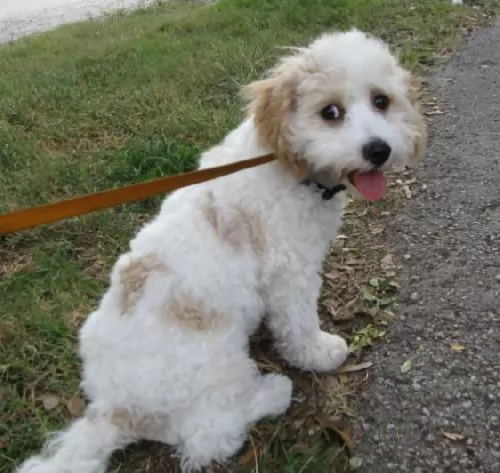 The Cavachon dog is a mix of the Bichon Frise and a Cavalier King Charles Spaniel. There isn’t much on the history of the dog but it seems as though certain kennels in Berryville, Virginia, in the United States are the first breeder of the dog, establishing the hybrid dog in 1996.
The Cavachon dog is a mix of the Bichon Frise and a Cavalier King Charles Spaniel. There isn’t much on the history of the dog but it seems as though certain kennels in Berryville, Virginia, in the United States are the first breeder of the dog, establishing the hybrid dog in 1996.
This attractive little toy breed has become one of the most popular cross-breed dogs to own in the United Kingdom, United States, Europe and other parts of the world. As it is a hybrid, the Cavachon isn’t recognized by the American Kennel Club (AKC), but it is recognized by the American Canine Hybrid Club (ACHC).
 This large breed dog is also known as the Mee Kyun Dosa. In spite of his huge size, he isn’t aggressive at all and is bred to be a companion dog.
This large breed dog is also known as the Mee Kyun Dosa. In spite of his huge size, he isn’t aggressive at all and is bred to be a companion dog.
He was originally developed to be a working dog. The dog was developed in the late 1800’s from European and Asian working breeds. Those interested in dog breeds suspected that a crossing of the Japanese Tosa-Inu with the Neapolitan Mastiff and the Dogue de Bordeaux brought about the breed. They also thought that the Saint Bernard and English Mastiff were brought in later on as well.
These large molosser dogs have been developed through years of inbreeding. It is one of the biggest dogs in Korea.
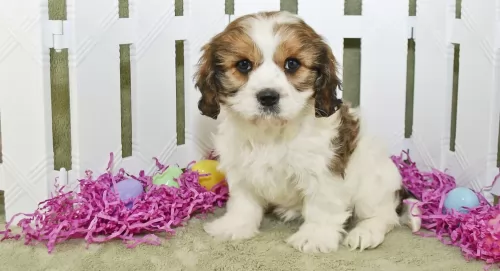 Cavachons are small dogs standing from 31 - 33 cm at the withers and weighing 4.5 - 9 kg. He has a medium-to-long silky coat which can be slightly wavy or even straight. The coat is available in several different colors – with white being the main color and he’ll have patches of apricot, tan and black or a mix of these colors.
Cavachons are small dogs standing from 31 - 33 cm at the withers and weighing 4.5 - 9 kg. He has a medium-to-long silky coat which can be slightly wavy or even straight. The coat is available in several different colors – with white being the main color and he’ll have patches of apricot, tan and black or a mix of these colors.
Individual dogs will vary to some extent depending on which parent breed is more dominant, but they’ve generally got a compact, well formed body and short legs. People with allergies appreciate this breed as they don’t shed a lot.
The Cavachon isn’t aggressive at all and they are sweet dogs, enjoying being around children. Their wonderful nature makes them a great therapy dog as they love to charm and delight people. He is tolerant of the actions of children as well as being able to get on well with other dogs and cats in the home.
Even small dogs like the Cavachon however can benefit from training and socialization, and then he becomes a wonderful obedient little dog. He is actually more robust than he looks and this is what makes him such a good pet for children.
He is a social little dog and just loves his human family and doesn’t want to be left alone for any long lengths of time. His lack of aggression means you can’t really rely on him to be much of a guard dog although he will give you some warning with his barking.
 You can’t help but stare at the Korean Mastiff because of his strong, muscular neck of loose skin that forms dewlaps. His face is wrinkled and he has a cumbersome, sluggish gait.
You can’t help but stare at the Korean Mastiff because of his strong, muscular neck of loose skin that forms dewlaps. His face is wrinkled and he has a cumbersome, sluggish gait.
He is a large dog standing at anything between 59 to 76cm in height, both male and female. He can weigh between 65 to 74kg. He is noticeable because of his fairly loose fitting coat, which is short and smooth and which is a rich, shiny reddish, orange or brown colour.
The nose of the dog is broad and dark, the ears soft and floppy and he has eyes which are set wide apart.
The Korean Mastiff is reserved with strangers but he is friendly and even tempered with his human family, making an ideal pet.
He is looked upon as a gentle giant, being an oversized playmate for children and he also tolerates other pets in the home.
He isn't an overly energetic dog, but that doesn't mean he shouldn't be exercised. He will need long walks to avoid him putting on weight.
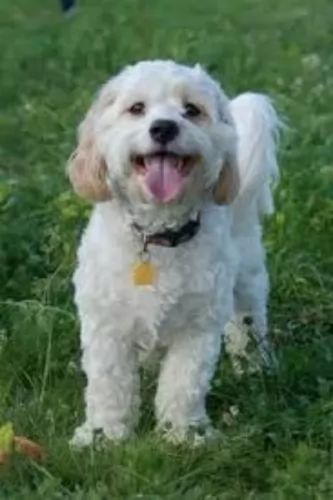 The sweet Cavachon is a balanced, happy, social dog and with his amicable nature and appealing looks, everybody wants him as a friend. He is fun and entertaining and makes a wonderful family pet and playmate for children.
The sweet Cavachon is a balanced, happy, social dog and with his amicable nature and appealing looks, everybody wants him as a friend. He is fun and entertaining and makes a wonderful family pet and playmate for children.
He gets on well with other pets in the home too. Even though he is a small dog, he will require training and socialization as his cuteness tends to make him want to assert himself over his owner. With socialization he becomes the most awesome, loyal and devoted little companion.
 Your huge Korean Mastiff is a good natured dog who isn’t aggressive. He loves being with his human family and makes a particularly good pet when he has been trained and socialized.
Your huge Korean Mastiff is a good natured dog who isn’t aggressive. He loves being with his human family and makes a particularly good pet when he has been trained and socialized.
He likes a firm but fair owner who takes a leader-of-the-pack role. In spite of his largeness and sluggishness, he can be quite agile and makes a good watchdog too.
All round, the Korean Mastiff, known as a gentle giant, is capable of making you a splendidly friendly, loving canine companion.
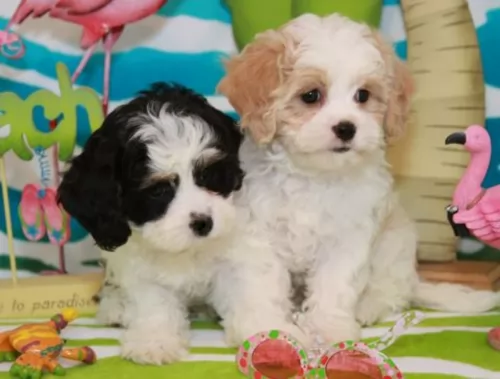 Although a mixed breed such as the Cavachon is considered healthy, they can still have their share of health problems. Some of the common health problems that the Cavachon may have to contend with and which come from the Cavalier King Charles Spaniel and the Bichon Frise are ear infections, liver problems, hip dysplasia and eye problems.
Although a mixed breed such as the Cavachon is considered healthy, they can still have their share of health problems. Some of the common health problems that the Cavachon may have to contend with and which come from the Cavalier King Charles Spaniel and the Bichon Frise are ear infections, liver problems, hip dysplasia and eye problems.
A healthy Cavachon who has been fed well and nurtured can live to be up to 15 to 18 years.
Arthritis is a disease seen in many dogs and it is inflammation of the joints because of wear and tear. You’ll notice lameness with your pet, stiffness, swelling, heat and pain and even depression.
Your pet may even display some aggressive behavior because of the pain, but this is excusable as this isn't an aggressive breed. Osteoarthritis is seen more often in senior dogs. Thankfully the good news is that arthritis can be managed by your vet.
 Treat your big Mastiff dog like the wonderful fur-child he is and make sure your attend to all his medical needs to avoid pain and discomfort for him.
Treat your big Mastiff dog like the wonderful fur-child he is and make sure your attend to all his medical needs to avoid pain and discomfort for him.
Cherry eye is a fairly common health issue with this breed. It affects the tear gland of the third eyelid, and if left untreated, can lead to ongoing eye problems.
All dogs have a third eyelid, as well as two tear producing glands to lubricate the eyes. Its an important protective component to eye health in dogs. When the connective tissue that holds the gland in place is damaged or weak, there is a red protrusion of the gland from the lower eye. This is a congenital disorder. Don’t ignore it, but get your pet to the vet so you can catch it early.
Canine bloat, known as gastric dilatation and volvulus can be a killer disease for your pet, more so with deep-chested, large breeds.
Gas accumulation is known as bloat, and its the accumulation of gas which can cause the stomach to rotate. A dog can go into shock from bloat. The reason for this is that the stomach expands, putting pressure on veins. Blood can’t flow as it should and the blood supply gets cut off to the stomach.
Your dog could be vomiting, restless, the stomach hard and bloated or he may be drooling. Dogs who gobble their food down and eat just one large meal a day have an increased susceptibility to GDV than other dogs.
The wrong ingredients of a dog’s diet can also contribute to bloat. High quality food and feeding your pet smaller meals can help.
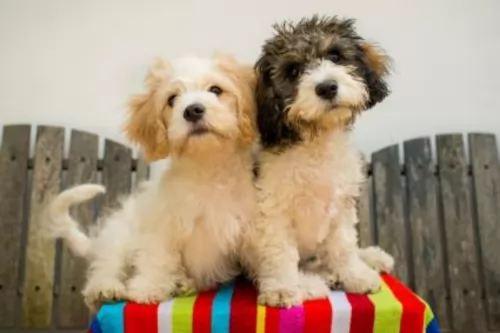 The Cavachon is a small dog, so if you have a nice sized garden, a lot of his exercise needs will be met. However he will still want a walk every other day and appreciate ball games in the garden. He can adapt to living in much smaller places but then he will certainly need to be exercised.
The Cavachon is a small dog, so if you have a nice sized garden, a lot of his exercise needs will be met. However he will still want a walk every other day and appreciate ball games in the garden. He can adapt to living in much smaller places but then he will certainly need to be exercised.
Small dog breeds like the Cavachon have a quick metabolism and you want to feed him a top quality dog food high in protein and fat. Protein is important as it supports growth in puppies and promotes lean muscle mass in adult dogs.
The Cavachon’s hair sheds very little, so grooming and brushing will only be required twice a week. His hair may need to be clipped every now and then to keep him well groomed. If you don’t have the experience or the required tools, a professional dog salon in your area will be able to do it for you.
The nails must also be clipped regularly and the ears kept clean and dry to prevent ear infections. His teeth will need to be cleaned at least 2 or 3 times a week with special dog toothpaste and toothbrush to prevent dental decay.
 A Korean Mastiff is an easy dog to groom with his short smooth coat. He is a moderate shedder so a brush twice a week will be sufficient to maintain the shiny, smooth condition of his coat.
A Korean Mastiff is an easy dog to groom with his short smooth coat. He is a moderate shedder so a brush twice a week will be sufficient to maintain the shiny, smooth condition of his coat.
Because the dog has lots of skin and folds, these folds will need to be washed and kept clean as grime can collect.
While you're busy attending to his skin check his nails too and check inside and outside his ears for signs of redness and irritation.
Puppies use up more energy than mature adults, requiring a diet of good quality protein. Dogs that have been spayed or neutered will require less calories as will senior dogs.
Korean Mastiffs require high quality nutrition, and if its dry kibble, make sure its the best brand. Mix in some home-made food such as cooked chicken, brown rice and vegetables from time to time as well as some raw meat occasionally.
Protein and fat from good sources are top ingredients for your Korean Mastiff. Avoid food with allergens such as corn and wheat, sweeteners, preservatives and colorants.
Make sure your large pet has constant access to fresh water.